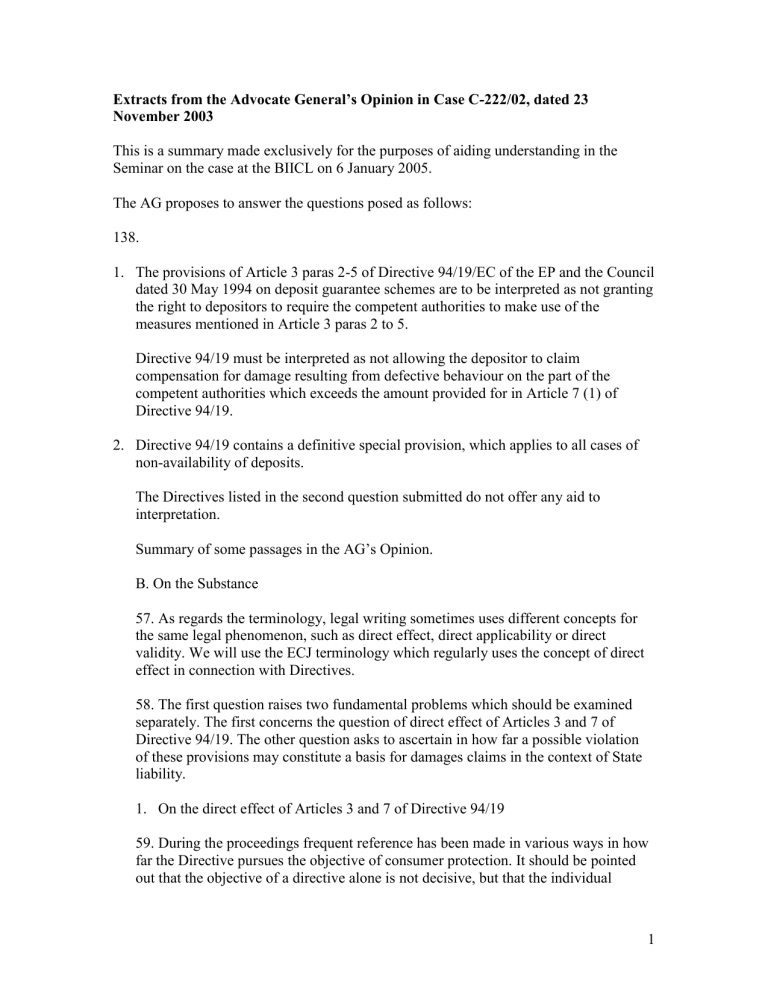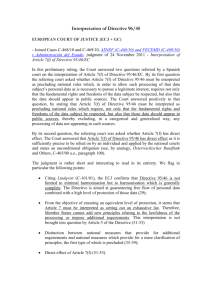Extracts from the Advocate General`s Conclusions in Case C

Extracts from the Advocate General’s Opinion in Case C-222/02, dated 23
November 2003
This is a summary made exclusively for the purposes of aiding understanding in the
Seminar on the case at the BIICL on 6 January 2005.
The AG proposes to answer the questions posed as follows:
138.
1.
The provisions of Article 3 paras 2-5 of Directive 94/19/EC of the EP and the Council dated 30 May 1994 on deposit guarantee schemes are to be interpreted as not granting the right to depositors to require the competent authorities to make use of the measures mentioned in Article 3 paras 2 to 5.
Directive 94/19 must be interpreted as not allowing the depositor to claim compensation for damage resulting from defective behaviour on the part of the competent authorities which exceeds the amount provided for in Article 7 (1) of
Directive 94/19.
2.
Directive 94/19 contains a definitive special provision, which applies to all cases of non-availability of deposits.
The Directives listed in the second question submitted do not offer any aid to interpretation.
Summary of some passages in the AG’s Opinion.
B. On the Substance
57. As regards the terminology, legal writing sometimes uses different concepts for the same legal phenomenon, such as direct effect, direct applicability or direct validity. We will use the ECJ terminology which regularly uses the concept of direct effect in connection with Directives.
58. The first question raises two fundamental problems which should be examined separately. The first concerns the question of direct effect of Articles 3 and 7 of
Directive 94/19. The other question asks to ascertain in how far a possible violation of these provisions may constitute a basis for damages claims in the context of State liability.
1.
On the direct effect of Articles 3 and 7 of Directive 94/19
59. During the proceedings frequent reference has been made in various ways in how far the Directive pursues the objective of consumer protection. It should be pointed out that the objective of a directive alone is not decisive, but that the individual
1
provision should be examined as to its direct effect. It is not contested that the directive aims to protect the consumer, but a directive usually pursues more than one aim, as is the case for this one.
60-62 Recall that an unimplemented directive may be relied upon by individuals if they are capable of having direct effect. Are the contested provisions sufficiently precise etc. for an individual to be able to rely on them? a) Concerning Article 7
63. The direct effect of this article is not contested nor subject of the proceedings; the matter was already recognised in the national court proceedings.
64. Moreover, it should be pointed out that Article 7 regulates certain claims to guarantees, but does not contain any reference to supervisory measures as contained in the first question. b) Concerning Article 3(1)
65-67. Something similar applies to this paragraph. It contains the obligation for each
Member State to ‘ensure that within its territory one or more deposit guarantee schemes are introduced and officially recognised’ and authorises MS to exempt a credit institution under certain circumstances from the duty to join such a scheme.
The Article does not, however, contain concrete provisions concerning supervisory measures as referred to in Q. 1 Such provisions appear in the other paras of Art. 3. Do those provisions, therefore, grant the right to individuals to require competent authorities to make use of the measures provided therein?
69. Concerning paras 2-5 the question of direct effect has been largely determined in that such provisions are capable of having direct effect even if they constitute a burden on third parties.
In the following paragraphs the AG examines the directive as to the direct effect of the supervisory measures; are they sufficiently precise and unconditional? She concludes (85) that they are not and that therefore individual depositors do not have the right to require the competent authorities to make use of the measures referred to in paras 2-5.
2.
On State liability
This concerns part 2 of Q. 1
86. The national Court essentially asks whether a damages claim is available in the context of State liability which has arisen through the omission of the supervisory authority to take the measures listed in Article 3 (2) to (5).
2
87. It should be emphasised that the proceedings do not concern the question whether incorrect implementation or application Art 7 of the directive could generate a claim of State liability.
Paras 88-93 examine the conditions for State liability as laid down by the ECJ in its consistent case law and concludes sufficient facts are available for the Court to undertake such an examination. a) 94-101
Does the directive give rise to individuals rights? The AG concludes paras 2-5 do not give rise to such rights. b) 102-104
Is there sufficient ground to find a violation of EC law?
There is, as there was non-implementation. c) 105-108 a causal link?
The AG doubts that there is a direct causal link.
She therefore concludes the depositor cannot raise a claim exceeding the amount in
Article (1) based on defective behaviour by the competent authorities.
B. Paras 120 – 136
Concern the national court’s question whether the other directives it refers to in its questions offer an aid to interpretation in answering the first question.
She analyses the connection between the directives, but concludes as follows in 135:
As regards the possible aspect of an aid to interpretation by the other directives it should be pointed out that the directives raise the point of protection of depositors, customers etc only in the grounds for the claim. These may constitute an aid to interpretation but those directives do not make provision for the relevant rights of depositors. This, together with the second objective of the directives, i.e. the achievement of the internal market, cannot have the effect that individuals have a right to require supervisory measures.
The third question does no longer need an answer.
3



